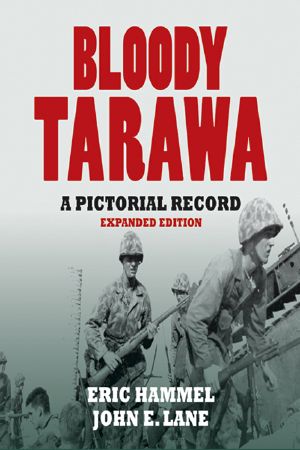Bloody Tarawa

- Authors
- Hammel, Eric
- Publisher
- Pacifica Military History
- Tags
- history , military , world war ii
- ISBN
- 9781890988470
- Date
- 1998-01-01T00:00:00+00:00
- Size
- 120.47 MB
- Lang
- en
On the morning of Saturday, November 20, 1943, the U.S. 2d Marine Division undertook the first modern amphibious assault against a well-defended beachhead. The objective was tiny Betio Island in Tarawa Atoll. The result was an classic story of tragedy and near defeat turned around into an epic of victory and indomitable human spirit.Built around the updated text of their 76 Hours: The Invasion of Tarawa, Hammel and Lane now reveal the graphic horror of warfare at its worst with the presentation of 307 photos and combat drawings taken from U.S. Navy and U.S. Marine Corps archives and several private collections. Many of the photos used in Bloody Tarawa have never been published before.Although the admirals commanding the Tarawa invasion fleet had assured the Marines that Betio would be pounded to coral dust by a massive naval and air bombardmentthe largest of its kind ever seen to that timethe first waves of Marines found the Japanese defenses intact and manned by...
Built around the updated text of their 76 Hours: The Invasion of Tarawa, Hammel and Lane now reveal the graphic horror of warfare at its worst with the presentation of 307 photos and combat drawings taken from U.S. Navy and U.S. Marine Corps archives and several private collections. Many of the photos used in Bloody Tarawa have never been published before.
Although the admirals commanding the Tarawa invasion fleet had assured the Marines that Betio would be pounded to coral dust by a massive naval and air bombardment—the largest of its kind ever seen to that time—the first waves of Marines found the Japanese defenses intact and manned by determined foes. Within minutes of the start of the head-on assault, the American battle plan was a shambles and scores of Marines had been killed or wounded. The assault virtually stopped at the water’s edge, its momentum halted before many Marines ever dismounted from the amphibian tractors that had carried them to the deadly, fire-swept beach. Follow-up waves of Marines suffered grievous casualties when they were forced to wade more than 500 yards through fire-swept, knee-deep water because tidal conditions had been miscalculated by the invasion’s planners.
BLOODY TARAWA
A Pictorial Record
Expanded Edition
Eric Hammel and John E. Lane
On the morning of Saturday, November 20, 1943, the U.S. 2d Marine Division undertook the first modern amphibious assault against a well-defended beachhead. The objective was tiny Betio Island in Tarawa Atoll. The result was an immortal story of tragedy and near defeat turned around into an epic of victory and indomitable human spirit.
Built around the updated text of their 76 Hours: The Invasion of Tarawa, Hammel and Lane now reveal the graphic horror of warfare at its worst with the addition of 307 photos and combat drawings taken from U.S. Navy and U.S. Marine Corps archives and several private collections. Many of the photos used in Bloody Tarawa have never been published before.
Although the admirals commanding the Tarawa invasion fleet had assured the Marines that Betio would be pounded to coral dust by a massive naval and air bombardment—the largest of its kind ever seen to that time—the first waves of Marines found the Japanese defenses intact and manned by determined foes. Within minutes of the start of the head-on assault, the American battle plan was a shambles and scores of Marines had been killed or wounded. The assault virtually stopped at the water’s edge, its momentum halted before many Marines ever dismounted from the amphibian tractors that had carried them to the deadly, fire-swept beach. Follow-up waves of Marines suffered grievous casualties when they were forced to wade more than 500 yards through fire-swept, knee-deep water because tidal conditions had been miscalculated by the invasion’s planners.
Follow the bloody battle for Betio in graphic detail as heroic American fighting men advance every life-threatening step across the tiny island in the face of what many historians agree was the best and most concentrated defenses manned by the bravest and most competent Japanese defenders American troops encountered in the entire Pacific War.